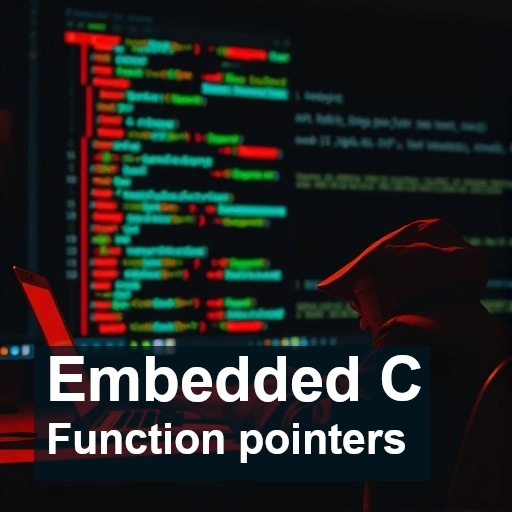In the C programming language, function pointers are a powerful feature that allows you to store the address of a function in a pointer variable. This ability makes it possible to call functions dynamically, pass functions as arguments, and implement callback mechanisms, among other things. Understanding function pointers is key to mastering advanced C programming techniques, especially when dealing with complex systems or low-level operations.
This article will provide an in-depth explanation of function pointers, their syntax, common use cases, and examples.
What is a Function Pointer?
A function pointer in C is a variable that stores the address of a function. This allows you to invoke the function indirectly, through the pointer. Function pointers can be used to create more flexible and dynamic programs, enabling functionality like passing functions as arguments or implementing callback functions.
Just like how you use a pointer to refer to a variable in C, a function pointer holds the address of a function, and you can use it to call the function.
Syntax of Function Pointers
The syntax for declaring a function pointer is slightly different from that of normal pointers because it must include the function signature (return type and parameters).
Here’s a basic syntax for declaring a function pointer:
return_type (*pointer_name)(parameter_types);
# example
int (*func_ptr)(int, int);In this example:
- int is the return type of the function.
- (*func_ptr) declares that func_ptr is a pointer to a function.
- (int, int) specifies that the function takes two int parameters.
Declaring and Assigning Function Pointers
To assign a function pointer, you need to assign it the address of a function that matches the signature.
Example:
#include <stdio.h>
int add(int a, int b) {
return a + b;
}
int main() {
// Declare a function pointer
int (*func_ptr)(int, int);
// Assign the address of 'add' function to func_ptr
func_ptr = &add;
// Call the function using the pointer
printf("Result: %d\n", func_ptr(5, 3)); // Output: Result: 8
return 0;
}
Calling a Function Through a Pointer
Once a function pointer is assigned to a function, you can call the function using the pointer. The syntax is:
pointer_name(arguments);
# Alternatively, you can use the dereferencing operator * to invoke the function:
(*pointer_name)(arguments);
Both of these are equivalent ways to call the function via the pointer.
Example:
#include <stdio.h>
int multiply(int a, int b) {
return a * b;
}
int main() {
int (*func_ptr)(int, int) = multiply;
// Call the function using the function pointer
printf("Multiplication: %d\n", func_ptr(4, 5)); // Output: Multiplication: 20
return 0;
}
Function Pointers as Arguments
Function pointers are particularly useful when you want to pass a function as an argument to another function. This can allow for dynamic behavior, where the behavior of the calling function depends on the function passed to it.
Example: Sorting with Comparison Functions
Suppose you want to sort an array, but the comparison criterion may change based on user input. You can pass different comparison functions using function pointers.
In this example:
- We use qsort (a C standard library function) to sort an array.
- The comparison function (compare_asc or compare_desc) is passed to qsort through the function pointer cmp_ptr.
Function Pointers and Callbacks
A callback is a function that is passed as an argument to another function. The calling function can invoke the callback at appropriate moments. Callback functions are widely used in event-driven programming or asynchronous operations.
Example:
#include <stdio.h>
// Callback function
void on_success(void) {
printf("Operation completed successfully!\n");
}
// Function that takes a callback
void perform_operation(void (*callback)(void)) {
// Simulate an operation
printf("Performing operation...\n");
// Call the callback function
callback();
}
int main() {
// Pass the callback function to perform_operation
perform_operation(on_success);
return 0;
}
Here, perform_operation takes a function pointer callback as an argument and calls it when the operation is complete. This is a typical example of how function pointers can be used in callback scenarios.
Array of Function Pointers
In more complex applications, function pointers can be used in arrays or structs. You can even have pointers to function pointers. This enables more dynamic and modular design patterns.
#include <stdio.h>
int add(int a, int b) {
return a + b;
}
int subtract(int a, int b) {
return a - b;
}
int main() {
// Array of function pointers
int (*operations[])(int, int) = {add, subtract};
// Call the functions via the array
printf("Add: %d\n", operations[0](5, 3)); // Output: Add: 8
printf("Subtract: %d\n", operations[1](5, 3)); // Output: Subtract: 2
return 0;
}
In this example: We have an array of function pointers, operations[], that can point to either the add or subtract function.We can dynamically select which function to call by using the index.
Conclusion
Function pointers are a powerful feature in C programming, providing flexibility, modularity, and the ability to implement dynamic behaviors in your code. They enable the use of callbacks, passing functions as arguments, and creating more reusable and flexible code. Although they may seem challenging at first, mastering function pointers can significantly improve your skills in systems programming, libraries, and software that requires highly configurable logic.
By understanding function pointers and applying them in various contexts, you’ll open the door to more efficient and elegant C programming.

